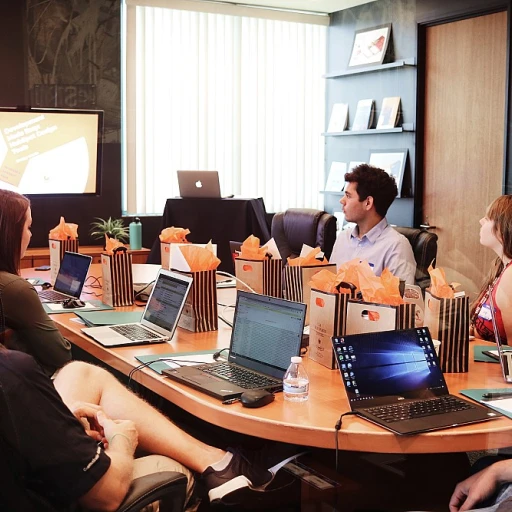
The Current Landscape of Industrial Staffing in NJ
The Current Dynamics of Industrial Staffing Services
The industrial staffing landscape in New Jersey presents a diverse ecosystem where companies seek top talent to fill a myriad of roles across various sectors. As businesses continue to evolve, so too does the demand for specialized staffing services. Equiliem, a prominent staffing company in the United States, exemplifies the commitment to connect companies with the right talent for industrial positions.While located in East Brunswick, many staffing companies put a strong emphasis on their ability to find people who can adapt to rapid shifts in the industry. They operate with the understanding that industrial roles are not just jobs; they're integral components that drive business success.
Several factors influence staffing decisions in the industrial sector. For instance, it's crucial for staffing services to understand the unique needs of their industrial partners. By doing so, they can create tailored programs that support company objectives, enabling them to find top talent efficiently.
Moreover, east coast locations like Kennedy Blvd in New Jersey can have their own set of regional requirements, further emphasizing the need for localized support in staffing. Many companies choose staffing services that demonstrate an on-the-ground understanding of the local business climate.
A robust industrial staffing strategy doesn't just focus on filling immediate vacancies but also considers long-term directions for talent acquisition and development. This ensures that businesses not only survive but thrive amid changing conditions. For readers interested in exploring potential career paths within the sales field, a good starting point is understanding what top sales careers for the coming year entail. These directions may influence how industrial staffing companies align their recruiting efforts to meet future demands.
Technological Advancements Shaping Staffing Services
Technological Innovation Paves the Way Forward
The landscape of industrial staffing services is undergoing a significant transformation in New Jersey, largely driven by technological advancements. As companies strive to meet the evolving demands of the industry, incorporating modern technology has become a necessity for maintaining efficiency and competitiveness. The introduction of smart technologies has made it easier for staffing companies to match top talent with industrial needs, removing barriers that previously hindered the staffing process.
One of the most notable changes is the adoption of digital platforms by staffing companies such as Equiliem, which have made it convenient for businesses to find people with the requisite skills and experience. These platforms offer a centralized hub for connecting job seekers with potential employers, thereby streamlining the recruitment process. As more staffing companies in regions like East Brunswick adopt these technologies, we see a growing integration of artificial intelligence and machine learning algorithms. These advancements are enhancing the ability to assess and predict workforce requirements with increased accuracy.
Automation and Artificial Intelligence Integration
Industrial sectors are rapidly embracing automation and AI to handle repetitive and intricate tasks. This shift significantly impacts staffing services as there is now a need for specialized talent adept at operating these new technologies. Consequently, industrial staffing companies are focusing on creating training programs that equip individuals with the skills needed to work alongside technology. Supporting these training programs is essential to ensuring that the workforce is prepared to engage effectively in tech-driven environments.
Moreover, integrating AI in staffing services is not only enhancing operational efficiency but also enabling better workforce management practices. For instance, companies can now utilize AI-driven analytics to predict staffing needs, manage workloads, and optimize workforce distribution effectively.
Keeping Up with Technological Trends
It is undeniable that embracing technological innovation is no longer optional, but rather essential for staffing services across the United States. Industrial staffing firms must remain proactive in adopting new technologies and continually upskilling their members to stay competitive. Whether you are a staffing company looking for top talent or a business in need of support, understanding and leveraging these technological innovations is key to navigating the future workforce landscape.
For more insights on how performance management training can enhance workplace efficiency in this tech-driven world, explore our detailed guide on enhancing workplace efficiency through performance management training.
Adapting to Workforce Demands and Skills Gaps
Aligning with Workforce and Skill Dynamics
The landscape of industrial staffing is undergoing significant changes as businesses, including those in New Jersey, strive to align with evolving workforce demands and address skills gaps. Companies recognize the necessity of developing strategic directions in aligning staffing programs with industry shifts. One key point is how businesses in East Brunswick and beyond are considering ways to attract top talent and find people who meet the technical and operational needs of today's industrial environments.
Talent acquisition strategies must now encompass a broader spectrum of skills required in modern industrial settings. Staffing services are evolving, adapting to find people with both traditional industrial competencies and new tech-savvy skills. This evolution is crucial in maintaining competitiveness within the United States industrial landscape, ensuring that companies can effectively support their operations.
Furthermore, partnering with a reliable staffing company can be pivotal in equipping businesses with the necessary resources to mitigate the growing skills gaps. A company well-versed in the dynamics of industrial staffing, such as Equiliem, provides a valuable resource by targeting a diverse talent pool and addressing specific skill demands. Their programs help industrial businesses not only to fill roles but to do so effectively and sustainably.
Additionally, this partnership can include equiliem's consultative support to navigate challenges presented by workforce shifts. The need for a collaborative approach between staffing organizations and business partners becomes evident in leveraging strategic talent acquisition and placement. Creating a robust staffing methodology may involve tapping into great resources, including seasoned experts and innovative recruitment practices, to deliver the right members to industrial teams.
The focus on bridging skills gaps and recognizing the demand for adaptable workforce strategies signals the direction industrial staffing is taking. As companies continue to seek out competitive advantages, such a strategic partnership in staffing services can be a defining move, clearing the path to industrial growth and sustainability. Exploring the evolution of workforce training offers valuable insights into how these dynamics influence modern staffing approaches.
The Role of Remote Work in Industrial Staffing
The Shift Toward Remote Opportunities
Remote work is becoming an integral part of industrial staffing, redefining how companies operate within New Jersey and beyond. As more businesses recognize the benefits of remote options, staffing companies find themselves at the forefront of navigating this new work dynamic. The industrial sector, traditionally focused on in-person roles, is gradually incorporating remote work models where feasible. This shift is not just about flexibility; it is also about tapping into a wider pool of talent across the United States. By embracing remote work, companies can move beyond geographical limitations, improving their chances of attracting top talent. Although remote work in industrial settings is not as straightforward as it is in other sectors, positions such as administrative roles, project management, and certain technical jobs within industrial staffing services are increasingly being adapted for remote environments. This evolution is a strategic response to the skills gap and workforce demands that are impacting New Jersey’s industry. Industrial staffing agencies, like the ones located on Kennedy Blvd and Ste East, provide invaluable support in adjusting to these changes. With their extensive network and expertise, they can identify and place candidates who not only have the right qualifications but also are comfortable and effective working remotely. However, this transition is not without challenges. Businesses must consider the implications for company culture, communication, and performance management in a virtual environment. Continuous investment in technology and training programs will be vital for companies to sustain this new work model effectively. Incorporating remote work opportunities can be a powerful strategy to ensure a company remains competitive. The directions taken by industrial staffing services will likely dictate how well these organizations adapt and thrive in an ever-changing labor landscape. Partnerships with staffing agencies, such as Equiliem, become essential in finding people who fit well into this evolving work arrangement.Regulatory and Economic Factors Influencing Staffing
Compliance and Market Fluctuations
The landscape of industrial staffing is deeply influenced by regulatory and economic factors, which necessitate strategic adaptability from staffing services. Equiliem, a key partner in providing industrial staffing services in New Jersey, must navigate an intricate web of regulations that vary across the United States. In East Brunswick and beyond, understanding local and federal laws is essential for staffing companies to stay compliant and competitive. Additionally, the economic environment, marked by fluctuating demand for industrial talent and jobs, impacts staffing capabilities and business operations.
Responsive Staffing Strategies
Staffing firms must develop robust strategies to respond to the unpredictable nature of market demands. By aligning industrial staffing services with economic trends, firms can effectively find people and deploy top talent to meet industry needs. For instance, when demand for certain skills peaks, companies can leverage staffing programs designed to quickly fill these gaps. Moreover, specializing in niche areas within the industrial sector can offer a competitive advantage, ensuring that staffing services remain relevant and well-positioned to support their clients' goals.
Collaboration with Regulatory Bodies
Partnerships with regulatory authorities are critical for navigating complex legislative landscapes. Staffing companies in New Jersey, and across the nation, must maintain close contact with these bodies to anticipate changes and adapt services accordingly. This proactive approach helps in mitigating potential disruptions in staffing services, ensuring continuous support for industry needs.
Economic Sensitivity and Strategic Alignment
Being attuned to economic fluctuations is vital for success in industrial staffing. A company’s ability to quickly pivot during economic downturns or capitalize on growth periods is often dependent on strategic planning and partnership capabilities. For instance, during economic contractions, staffing firms might prioritize industries less affected by the downturn to maintain business flow. Conversely, expansion phases present opportunities to enhance service offerings and secure a foothold in emerging markets.
Strategies for Future-Proofing Industrial Staffing
Planning for Longevity in Staffing Operations
Ahead of the evolving landscape, the industrial staffing sector must consider strategic adaptations to future-proof their operations. As workforce demands continue to change and technological advancements shape the industry, businesses must remain agile to sustain their growth and success.
Firstly, to remain relevant, staffing companies in industrial hubs like East Brunswick need to build strong, collaborative partnerships with leading industry players. By partnering with businesses and being proactive in forecasting workforce needs, staffing services can better align their program offerings to fill roles effectively. Addressing skills gaps identified in emerging sectors should be a continuous process, ensuring that talent pipelines are robust and diversified. Equiliem, for example, supports its clients by providing top talent equipped with the skills necessary to thrive in a modern industrial market.
Furthermore, leveraging data analytics and emerging technologies can enhance recruitment efficiency, enabling staffing services to pinpoint and contact individuals who best meet the criteria for industrial jobs. Companies like Equiliem lead the charge by incorporating AI and machine learning to streamline the candidate matching process, improving both hiring speed and quality of hire. This data-driven approach also aids in identifying industry trends, guiding business directions and investments.
In light of remote work's growing role, particularly discussed in our previous consideration, industrial staffing companies must develop flexible working arrangements. By integrating remote capabilities where applicable, staffing firms can attract a broader range of talent, tapping into nationwide resources. This trend has expanded significantly in the United States, requiring staffing companies to adapt accordingly.
Lastly, remaining compliant with regulatory and economic factors is crucial. Keeping a tab on political and legal changes ensures that staffing services operate within legal frameworks, maintaining credibility and trust among industry partners and employees. Through these proactive strategies, staffing companies can secure their place in an industry that's continually evolving.













